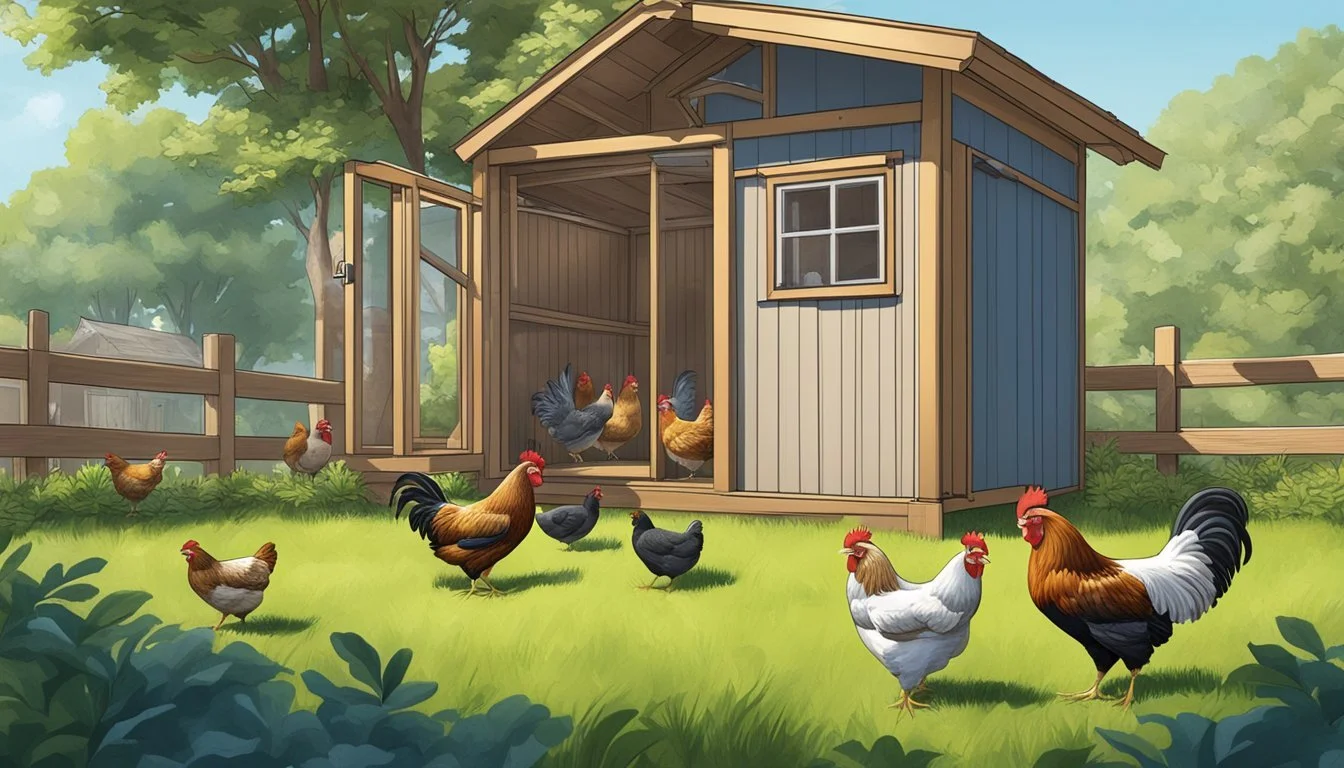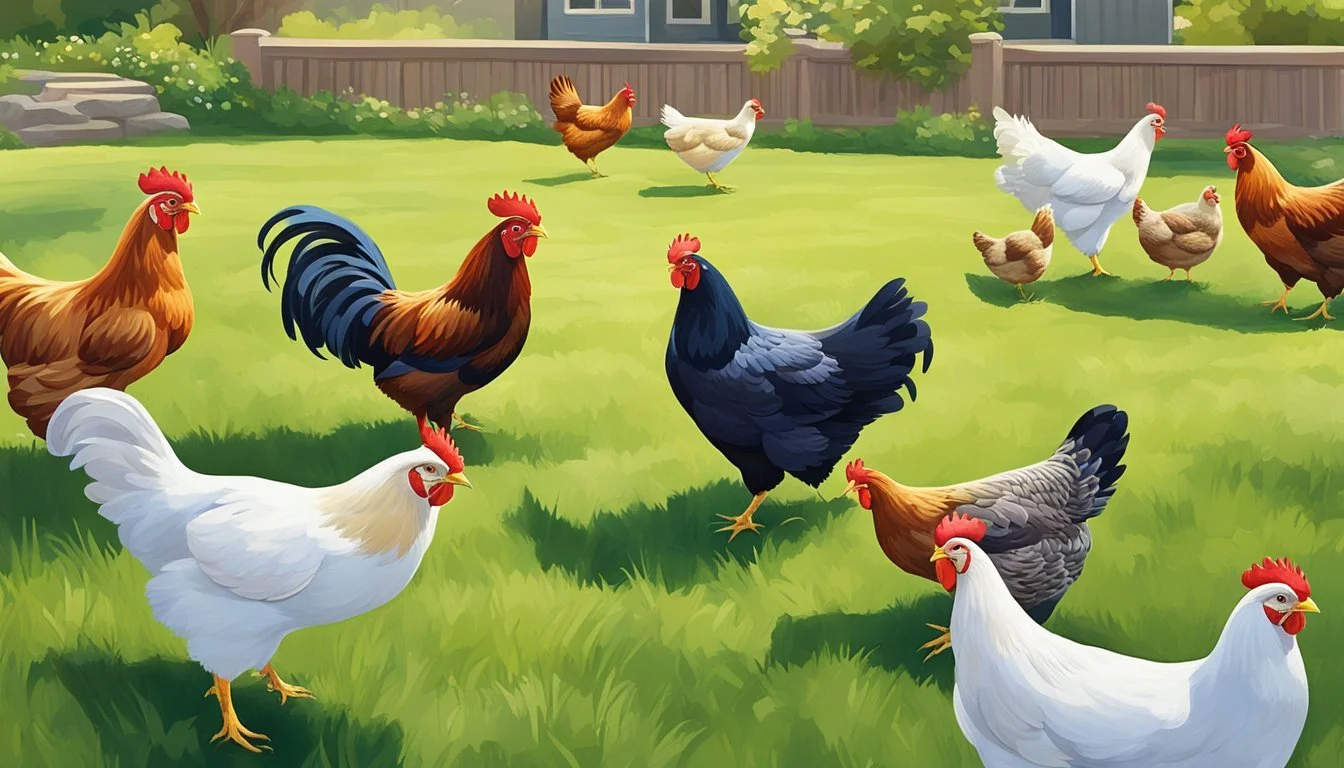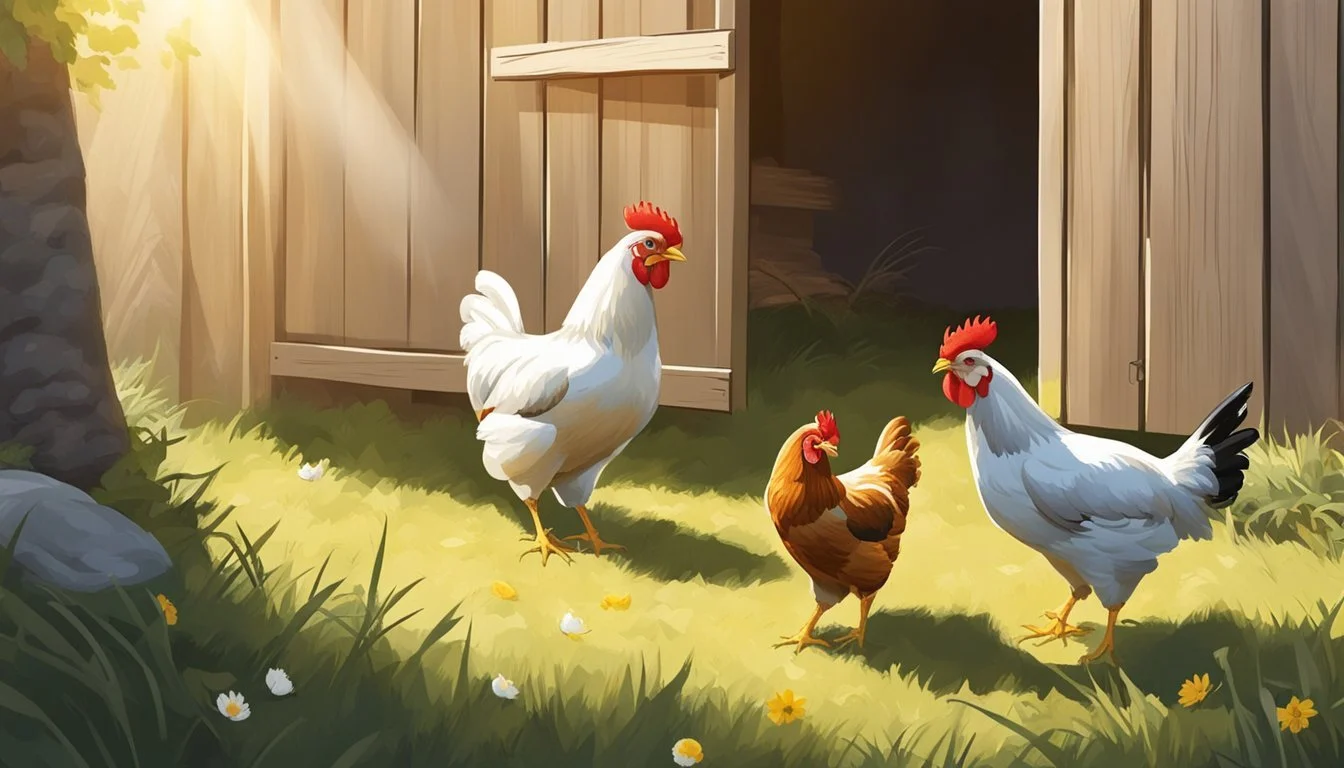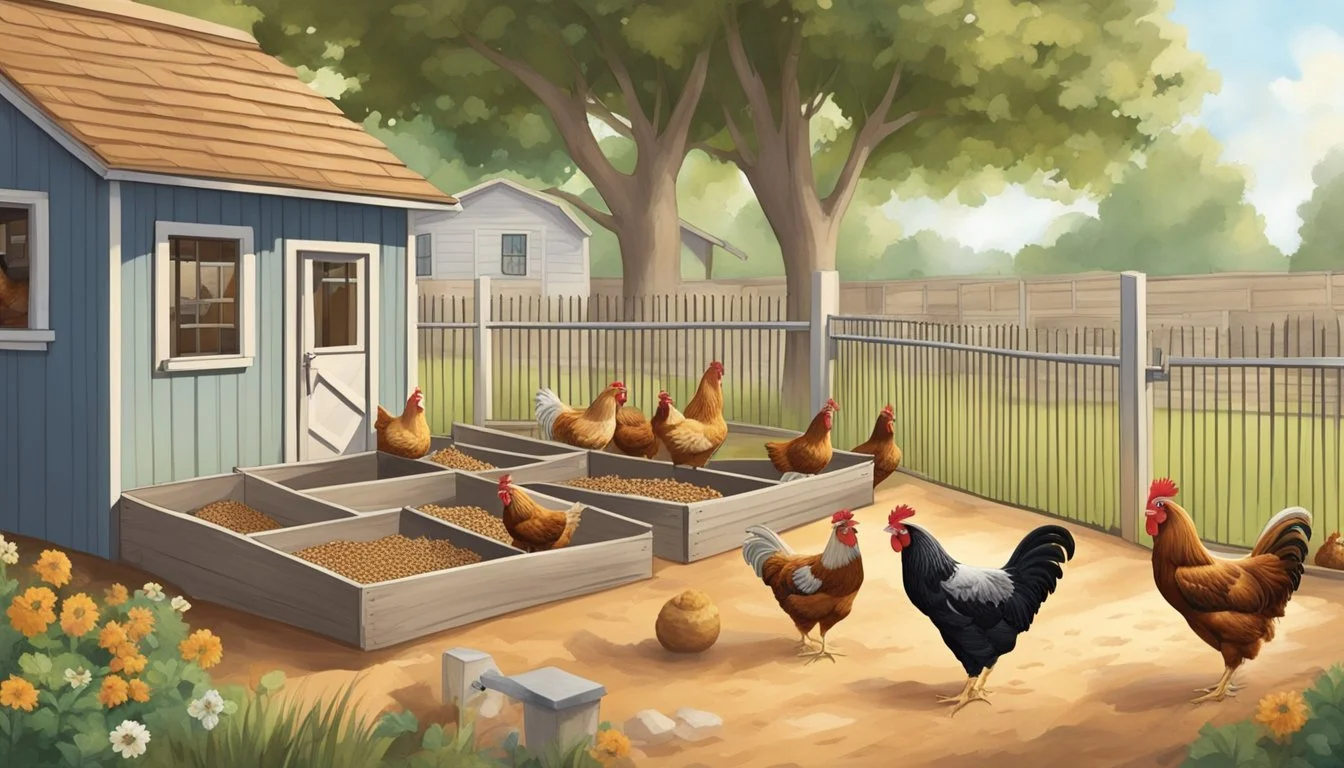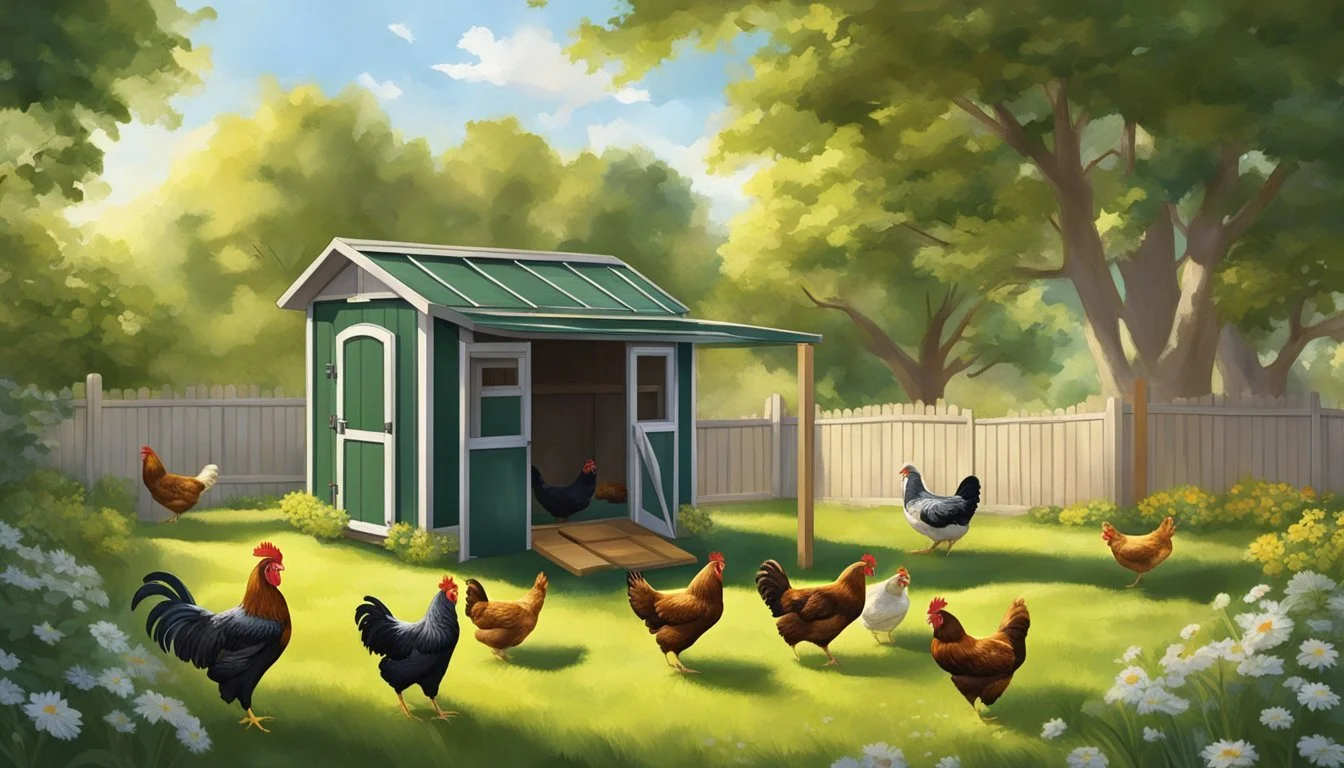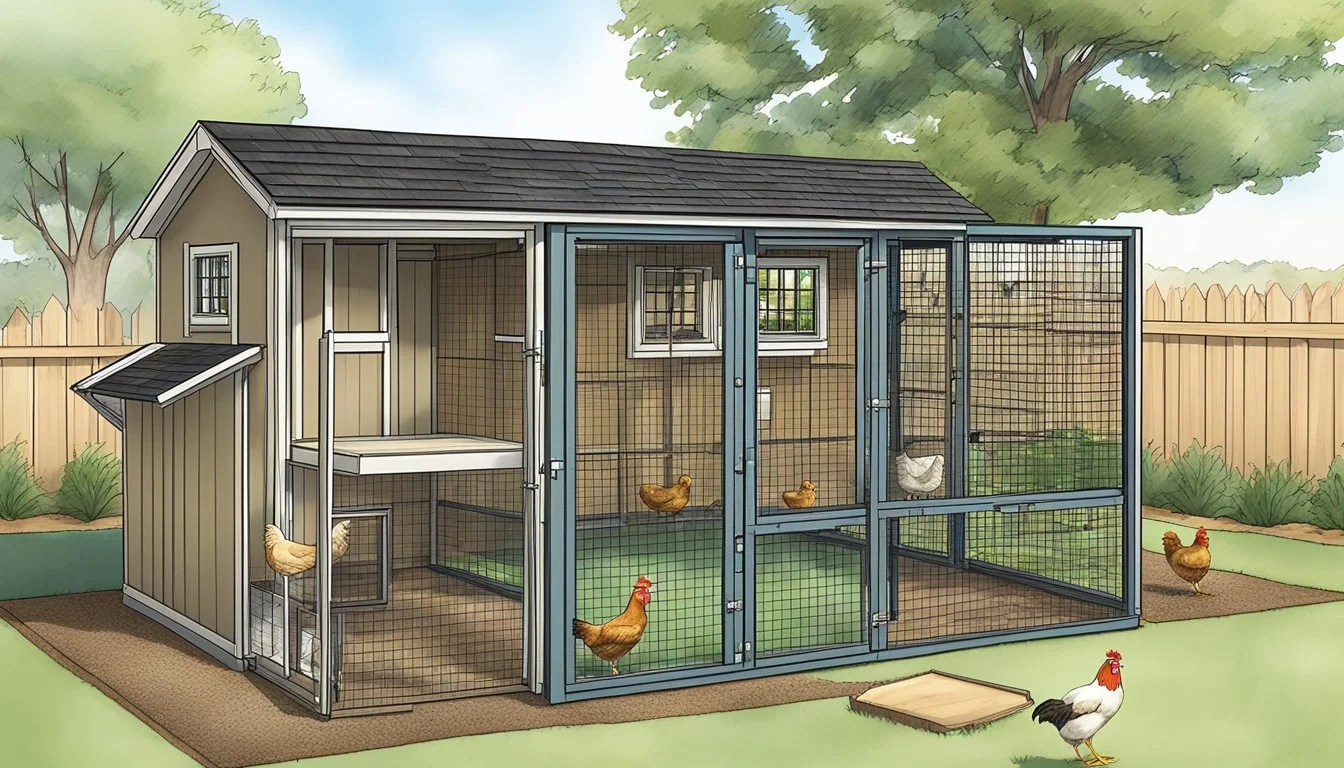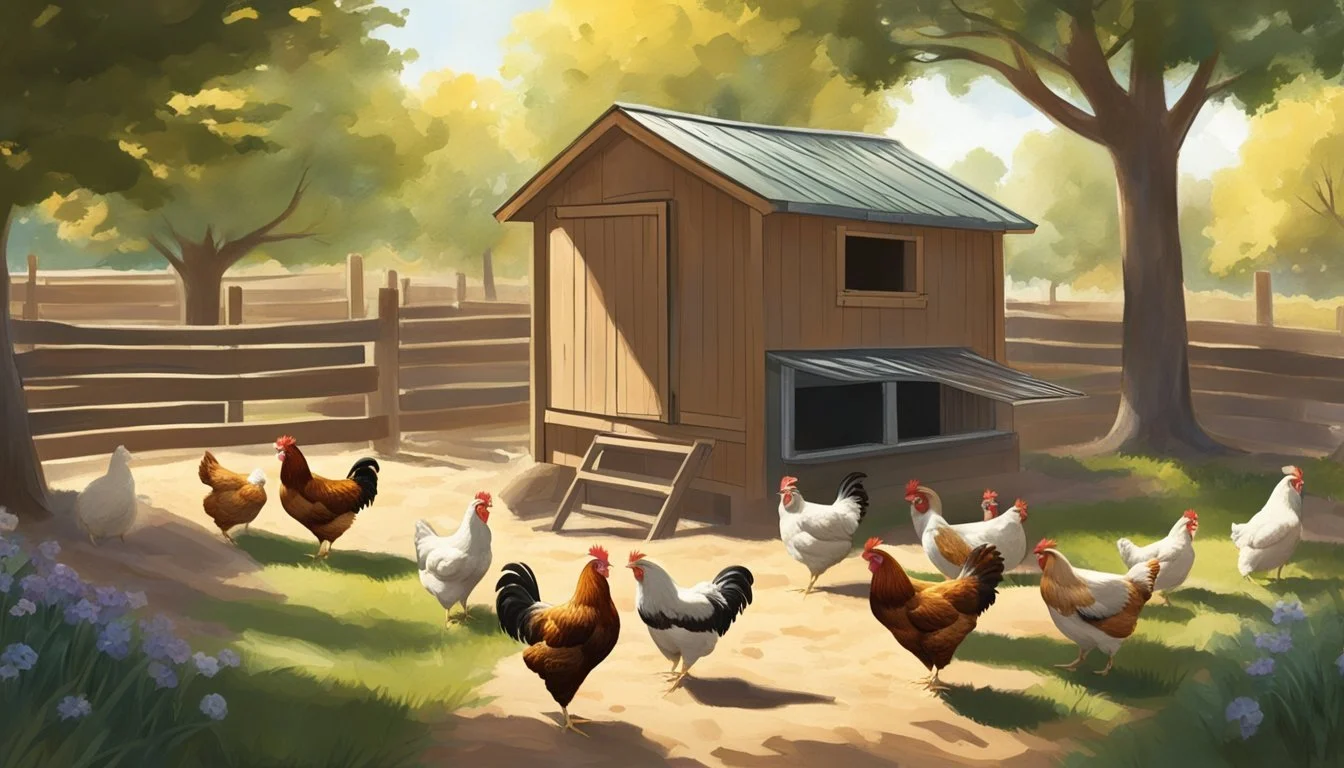Raising Backyard Chickens in Broomfield, CO
An Essential Guide to Local Urban Poultry
Raising backyard chickens has become an increasingly popular hobby in Broomfield, Colorado, where residents appreciate the sustainable lifestyle and local produce that comes with keeping poultry. The city of Broomfield permits residents to have up to five chickens in single-family residential areas, under certain restrictions. For those looking to embrace this practice, it is essential to understand Broomfield's specific regulations and how to responsibly care for these birds.
Residents interested in keeping backyard chickens must obtain a license and adhere to city codes designed to maintain both the health of the chickens and the harmony of the neighborhood. These codes specify requirements regarding coop construction, placement, and maintenance to ensure the welfare of the chickens and minimize any potential nuisance to neighbors. By following these guidelines, Broomfield residents can successfully integrate chicken raising into their backyard gardening and food production efforts.
With the proper information and resources, raising backyard chickens in Broomfield can contribute to a self-sufficient lifestyle while providing enjoyment and educational opportunities for the entire family. The city's regulations ensure that this practice is carried out in a manner that is respectful of both animal welfare and community standards. Through this guide, individuals can learn about the essential steps to start and maintain a healthy flock within the unique context of Broomfield's local ordinances.
Understanding Local Chicken Ordinances in Broomfield
In Broomfield, Colorado, raising backyard chickens is regulated by local ordinances designed to ensure the well-being of the chickens, as well as the harmony of residential neighborhoods. Residents need to adhere to specific zoning regulations and may need to go through a permit process.
Zoning Regulations and Requirements
Regulations in Broomfield allow the keeping of chickens in single-family residential areas, but several requirements must be met. Key provisions include:
Limit on Number of Chickens: A maximum of five chickens per residential lot.
Prohibition of Roosters: Only hens are permitted, to minimize noise.
Housing Requirements: Chickens must be housed in a coop and a secure enclosure.
Location of Coop: Coops must be positioned at least 10 feet away from property lines to minimize any disruptions to neighbors.
Before setting up a chicken coop, it's advisable for residents to check with local zoning ordinances for the latest updates and more detailed information.
Permit Process and Restrictions
Broomfield may require residents to undergo a permit or license process for raising backyard chickens. Key aspects of the process can include:
Application: Submission of an application, detailing how local regulations will be adhered to.
Inspection: A possible inspection of the proposed chicken coop location to ensure compliance with city codes.
Fees: Payment of any associated fees required to obtain the permit.
Residents are expected to maintain their chicken coops in a manner that prevents odors and pests and to properly care for their chickens. Compliance with these local regulations helps promote the welfare of the chickens and consideration for neighbors.
Choosing the Right Chicken Breeds
When selecting chicken breeds for a backyard flock in Broomfield, CO, homeowners should consider egg production, the suitability of the breed as a pet, and the breed’s adaptability to local climate conditions.
Best Breeds for Egg Production
For homeowners prioritizing egg production, several breeds stand out for their prolific laying capabilities:
Rhode Island Red: A hardy breed that can lay up to 250-300 brown eggs per year.
Australorp: Known for their impressive laying rate, they can produce around 250 light brown eggs annually.
Sussex: These hens offer a good supply of eggs, approximately 250 per year, and can lay well during the winter.
Best Breeds for Pets
Families looking for chickens that make good pets should consider these friendly and docile breeds:
Orpington: A heavy, fluffy breed with a calm and friendly disposition, ideal for families.
Wyandotte: A breed with a friendly temperament, also prized for its distinctive patterned feathers.
Barred Rock: These chickens are known for their easygoing nature, making them suitable as pets.
Considerations for Broomfield's Climate
Broomfield's climate, with its cold winters, necessitates choosing breeds that can withstand cooler temperatures:
Wyandotte: With their thick feathers, they are well-suited for colder climates and less prone to frostbite.
Jersey Giants: As the largest purebred chicken breed, they are robust and can tolerate cold well.
Orpington: Their dense plumage offers good insulation against the cold weather commonly experienced in Broomfield.
Homeowners should consider these factors to ensure their flock thrives in Broomfield’s environment, aligns with their egg production goals, and meets their expectations for companionship.
Setting Up Your Chicken Coop
A successful backyard chicken venture in Broomfield, Colorado, begins with designing a chicken coop that's spacious, secure, and hygienic. Coop planning is vital to ensure that chickens thrive and are protected from potential threats.
Coop Size and Space Requirements
Every chicken requires at least 2-3 square feet inside the coop and 8-10 square feet in the outdoor run. Consequently, a coop that will house five chickens should be at least 10 square feet inside with a run of at least 40 square feet to afford ample space for natural behaviors such as scratching, dust bathing, and roosting comfortably.
Minimum Indoor Space:
5 chickens X 2-3 sq ft = 10-15 sq ftMinimum Outdoor Space:
5 chickens X 8-10 sq ft = 40-50 sq ft
Protecting Against Predators
A predator-proof coop and run are vital for the birds' safety. The coop should be fortified with heavy-duty wire mesh to deter predators such as foxes, raccoons, and birds of prey.
Walls & Floor: Use 1/2 inch hardened hardware cloth for walls and bury it at least 12 inches underground to prevent digging predators.
Locks: Install raccoon-proof locks on doors and nesting boxes.
Roof: Ensure the coop has a solid roof that is impenetrable by climbing or flying predators.
Maintaining a Clean and Healthy Coop
To keep the coop clean and healthy:
Bedding: Use straw, wood shavings, or sand for the floor to absorb waste and simplify cleaning. Replace or refresh bedding regularly to prevent dampness and the build-up of ammonia.
Ventilation: Ensure adequate ventilation to reduce moisture and ammonia levels, preventing respiratory issues in chickens.
Nest Boxes: There should be at least one nest box per four hens, positioned in a dark, quiet corner of the coop for egg-laying. Clean and replace the bedding in the nest boxes frequently.
By adhering to these guidelines for space, safety, and sanitation, residents of Broomfield, CO can create a chicken coop that promotes the well-being of their backyard chickens.
Day-to-Day Chicken Care
Taking care of chickens requires consistent, daily attention to ensure they have the food and water they need and are kept healthy. Monitoring their feed, water, and health are the crux of these daily tasks.
Feeding Your Chickens Properly
Daily feeding: Chickens need proper nutrition to lead healthy lives and produce eggs. For chicks aged 0-8 weeks, an 18-20% starter feed is recommended. From 8-14 weeks, a 16-18% starter/grower feed should be provided. Finally, a 16% finisher feed is suitable for chickens from 15-18 weeks. Adult chickens benefit from layer feed balanced with 16% protein to support egg-laying.
Consistency: Feed your chickens at the same times each day to establish a routine.
Feeder: Use a feeder to dispense chicken feed, which helps prevent waste and contamination.
Treats: Offering mealworms can provide extra protein and is a welcome treat, but should not make up more than 10% of a chicken's diet.
Calcium: Hens require calcium for strong eggshells. Offer oyster shells as a supplement.
Grit: Free-range chickens usually find enough grit naturally, but for those in confined spaces, provide commercial grit to aid in digestion.
Water and Hydration
A constant supply of fresh, clean water is critical for a chicken's health. The average hen consumes about one cup of water a day, increasing to two cups or more in hot weather.
Tip: Place the waterer in a shaded area during summer to keep the water cool.
Health Checks and Preventing Disease
Daily observations: Watch your chickens for any signs of illness, such as lethargy, lack of appetite, or abnormal droppings. Early detection is key in preventing the spread of disease within the flock.
Cleanliness: Regular cleaning of the coop and feeder/waterer equipment will reduce the likelihood of disease.
Vaccinations and Veterinary Care: Keep up with recommended vaccinations and establish a relationship with a local veterinarian familiar with poultry.
Remember, consistent care is the cornerstone of a healthy and productive backyard flock!
Rearing Chicks Successfully
Raising backyard chickens in Broomfield, CO, starts from the ground up, with particular attention to the early life stages of chickens ensuring they grow into a healthy flock.
Incubation or Purchasing Baby Chicks
When beginning the journey of rearing chicks, one can either incubate hatching eggs or purchase baby chicks. Incubation requires maintaining a steady temperature of 99.5°F and a humidity of around 50-65%, carefully increased to about 70-75% during the final days of hatching. If purchasing chicks, it is essential to source from reputable hatcheries or farms that ensure proper care during shipping, keeping the baby chicks safe and stress-free.
Brooding and Temperature Control
After hatching or purchasing, chicks must be placed in a brooder. A brooder acts as a controlled environment offering warmth, as a mother hen would provide. During the first week, maintain a temperature of 95°F, decreasing by 5°F each week until they are acclimated to the outdoor temperature. Consistent temperature regulation is crucial, as fluctuations can cause health issues.
Brooding Temperatures:
Week 1: 95°F
Week 2: 90°F
Week 3: 85°F
Week 4: 80°F
Below Week 5: Decrease by 5°F until reaching outdoor temperature
Temperature should be monitored with a thermometer and not by estimating, ensuring the chicks' environment is neither too hot nor too cold.
Transitioning Chicks to the Flock
Transitioning chicks to the flock involves gradually introducing them to the rest of the birds, ensuring they are fully feathered and can regulate their body temperature. This often occurs around the 6-8 week mark. Initially, separate them using a fence to allow both the chicks and the adult chickens to get accustomed to each other. Once the chicks are about the same size as the pullets, they can be integrated into the flock. At this stage, they should be adapted to starter feed, which promotes healthy growth up until they are 18 weeks old when they transition to layer feed.
Egg Collection and Usage
Raising backyard chickens in Broomfield, CO, provides residents with the opportunity to collect and use fresh eggs. It is crucial to ensure that the chickens have a comfortable environment for laying eggs and that the eggs are collected and stored properly to maintain their freshness.
Setting Up Nesting Boxes for Egg Laying
For optimal egg laying, each hen requires a nesting box that measures 12x12x12 inches. Bedding materials should include straw or wood shavings to provide a soft, secluded area for the hens. Nesting boxes should be placed in a quiet part of the coop to encourage the hens to lay their eggs there.
Collecting and Storing Eggs
Daily Collection: Eggs should be collected every day to ensure they are fresh and to discourage hens from getting broody.
Cleaning Eggs: Gently clean any dirt off the eggs with fine sandpaper, a brush, or a cloth. Avoid washing them, as this can remove the protective bloom.
Storage: Store the eggs in a cool, dry place, ideally in a refrigerator to extend their freshness. They can be arranged with the pointed end down to keep the yolk centered.
Using Eggs from Your Backyard
Fresh eggs from backyard chickens can be used just like store-bought eggs for cooking and baking. They can be kept at room temperature for a couple of weeks but will last longer if refrigerated. For extended storage, eggs can be beaten and frozen in airtight containers with a date label. Adding a pinch of salt or sugar before freezing can improve their texture after thawing.
Beyond Eggs: Other Benefits of Raising Chickens
Raising chickens in Broomfield, CO goes far beyond fresh egg production. Homeowners find that these birds offer substantial benefits to their gardens and contribute valuable waste for composting.
Chickens as Garden Helpers
Chickens naturally engage in behaviors such as scratching and pecking, which are beneficial in a garden setting. They control pests by consuming insects, snails, and other small invertebrates that might be harmful to plants. The birds' activity also helps to aerate the soil, which encourages healthy root growth. Homeowners should monitor their chickens in the garden to ensure they do not damage delicate plants.
Manure and Compost Contributions
Chicken manure is an excellent source of nitrogen, an essential component of a fertile garden. Here's a comparison of nitrogen content in various manures:
Type of Manure Nitrogen Content Chicken High Cow Moderate Horse Moderate
By adding chicken manure to a compost pile, residents can create a rich and balanced fertilizer, which significantly enhances soil quality. It's important to compost chicken manure before application to the garden because fresh manure can be too potent and may harm plants.
Challenges and Solutions in Chicken Keeping
Raising backyard chickens in Broomfield, CO, presents unique challenges that require practical solutions to ensure a harmonious community and the well-being of the chickens. This section explores effective strategies for managing noise and maintaining positive neighbor relations, as well as addressing the sensitive subject of slaughter and end-of-life care.
Handling Noise and Neighbor Relations
Noise from chickens, predominantly from roosters, can lead to disturbances and strained relations with neighbors. Here are some specific steps to mitigate noise:
Choosing Hen-Only Flocks: Stick to hens as they are significantly quieter than roosters.
Proper Coop Insulation: A well-built coop with sound-proofing materials can muffle sounds.
Regular Care and Check-ups: Content chickens are quieter, so regular feeding and veterinary care keeps noise levels down.
Maintaining neighbor relations isn't just about controlling noise; it involves community engagement.
Transparent Communication: Share plans and updates with neighbors before beginning chicken-raising endeavors.
FAQ Sheets: Create a frequently asked questions document to educate neighbors about chicken keeping.
Dealing with Slaughter and End of Life
Chicken slaughter and the topic of end-of-life care can be challenging, requiring sensitive handling:
Local Regulations: Familiarize with and adhere to Broomfield ordinances regarding chicken slaughter.
Humane Practices: Employ methods that are fast and cause the least distress to the birds.
End-of-Life Services: For individuals uncomfortable with the process, outsourcing to local services that handle slaughter is an option.
Understanding and compassion are essential in these areas of backyard chicken keeping.
Advanced Topics in Backyard Poultry
Raising backyard chickens necessitates not only a foundational understanding of poultry care but also an awareness of advanced practices that promote healthy flock management and sustainable expansion.
Breeding and Managing Your Flock
For Broomfield residents, breeding backyard chickens demands adherence to local regulations. One must ensure that the flock size is suitable for the given space and that the coop can accommodate the growing number of birds. When planning for breeding, they should select for healthy traits to maintain a robust flock. Essential supplies include:
Nesting boxes: One per 4-5 hens.
Breeder feed: Contains extra nutrients to support reproduction.
Broody coop: A separate area for hens to safely hatch chicks.
Prospective breeders need to be prepared for the complexities breeding entails, such as the genetics of egg production and bird temperament.
Sustainable Practices and Expanding Your Coop
To ensure sustainability, one should consider implementing practices such as composting chicken waste and rotating pastures. Expansion of the coop and runs should coincide with the increase in flock size while maintaining state-recommended space requirements to promote bird health. Key considerations include:
Space: At least 3 square feet per chicken inside the coop, and 8-10 square feet in the run.
Material: Use durable, weather-resistant materials for new constructions.
Design: Ensure adequate ventilation and protection from predators.
By incorporating these advanced topics into their poultry-raising ventures, individuals in Broomfield, CO, can achieve a thriving and sustainable backyard chicken habitat.
Resources and Support for Chicken Keepers
For residents of Broomfield, Colorado, a robust network of support and resources is available for those interested in or actively raising backyard chickens. These resources offer essential information and foster a sense of community among poultry enthusiasts.
Local Groups and Online Communities
Broomfield Chicken Keepers Association: This local organization provides a platform for chicken keepers to share information and support each other. They often organize educational programs and workshops, helping new and experienced chicken owners alike.
Online Forums: Websites such as BackYard Chickens offer discussions and advice tailored to the Broomfield area.
Social Media: Facebook groups and online communities connect Broomfield residents with fellow chicken enthusiasts in the country and in the greater Denver area.
Staying Updated with Laws and Best Practices
Municipal Regulations: It’s imperative that chicken keepers in Broomfield stay informed about local ordinances. City council updates, accessible on the Broomfield municipal website, provide insight into legal requirements for raising chickens.
Best Practices: For maintaining chicken health, especially during Colorado’s variable weather, resources on proper shelter, heat stress prevention, and pest control are crucial.
Educational Websites:
ChickenLaws.com: Offers specific guidance on keeping chickens in Colorado's climate.
Broomfield.org FAQs: Delivers information on local regulations, including necessary permits and city contact points for poultry-related queries.
Conclusion
Raising backyard chickens in Broomfield, CO is a viable venture for those who wish to engage in small-scale poultry farming. Novice keepers can find success with a carefully managed small flock. Before embarking on this journey, individuals must familiarize themselves with Broomfield’s specific guidelines and regulations, ensuring their endeavor aligns with local ordinances.
Residents are permitted to have a limited number of chickens, usually up to five hens, providing an opportunity to enjoy fresh eggs and the experience of keeping poultry. However, no roosters are allowed, to minimize noise disturbances. When setting up a coop, it's essential to maintain a distance of at least 10 feet from property lines for optimal community relations and compliance with city codes.
Key Considerations for Prospective Chicken Keepers in Broomfield:
Understand Local Regulations: Check the most current city ordinances to ensure compliance.
Coop Requirements: Keep coops 10 feet from property lines and maintain cleanliness.
Chicken Limit: Typically up to five hens are allowed; roosters are prohibited.
Community Interaction: Engage with neighbors to foster a supportive environment.
Selecting docile breeds suited to the climate and backyard conditions can increase the chances of a harmonious and productive backyard chicken experience. Chicken keepers should prioritize the well-being of their flock, as healthy chickens are fundamental to the success of any chicken-raising endeavor.
In summary, with structured guidance and adherence to Broomfield's specific requirements, one can confidently maintain a thriving backyard chicken habitat.

